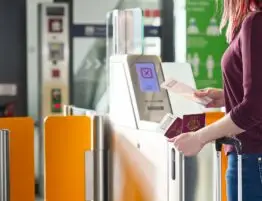
The UK government is rolling out a new e-visa system aimed at modernizing its immigration process, but concerns are mounting that the digital shift could lead to unintended consequences, particularly for those who struggle with technology access and documentation. The new system, set to streamline the visa application and verification process, is part of the country’s broader efforts to manage immigration in a post-Brexit era. However, critics warn that it could create vulnerabilities, particularly for individuals without a digital footprint or those at risk of bureaucratic mismanagement.
What is the E-Visa Scheme?
The e-visa system will eliminate physical documentation for visa holders, transitioning all immigration status records into a digital format. This shift is designed to make border management more efficient and less reliant on physical papers, while also allowing authorities to update visa statuses in real-time. The UK is positioning this as a forward-thinking approach to managing its borders and ensuring that immigration policies reflect the needs of a digitized world.
However, for many visa holders, especially vulnerable groups such as older migrants, low-income individuals, and those unfamiliar with technology, the transition to a fully digital system presents significant challenges. These groups are already at risk of exclusion in other areas, and the introduction of e-visas could compound the problem, especially if their legal status becomes dependent on access to and understanding of online systems.
Concerns Over Documentation and Data Management
One of the most pressing concerns is the risk of people being left without proof of their legal status in the UK. In the past, the country’s Home Office has faced criticism for mismanaging immigrant documentation, most notably in the Windrush scandal. This 2018 debacle saw lawful immigrants from the Caribbean wrongfully detained, denied services, or even deported due to missing or incorrectly handled documentation. Critics of the e-visa system argue that this digital-first approach could give rise to a similar issue on a broader scale.
For example, if individuals are unable to access their digital visa records—whether due to a lack of internet access, technical errors, or system outages—there is concern they could face difficulties proving their right to live and work in the UK. This could lead to the denial of employment, housing, or even healthcare, echoing the injustices seen during the Windrush scandal.
Digital Exclusion and Its Impact on Immigrant Communities
Digital exclusion is a real issue for many people, particularly those who are elderly, have lower incomes, or are not proficient in technology. Migrant communities may be disproportionately affected by this shift, as not all individuals have access to smartphones or reliable internet connections. Furthermore, the language barrier could make navigating the new e-visa system even more difficult, especially for non-English speakers.
While the government has promised that assistance will be available for those who need help accessing their e-visa information, concerns remain about how accessible this support will be in practice. Some fear that, without proper safeguards, vulnerable individuals could be penalized simply for not being tech-savvy.
The Broader Immigration Policy Context
The introduction of the e-visa scheme is just one part of the UK’s evolving immigration policy. In recent years, the country has taken steps to tighten its borders and exercise greater control over who can live and work in the UK, particularly in the wake of Brexit. The e-visa system is seen as a way to enforce these policies more effectively, ensuring that immigration statuses are easier to track and harder to misrepresent.
However, the potential for mistakes, particularly in a system that relies heavily on digital tools, cannot be ignored. Human errors in data entry, system bugs, or even cyber-attacks could jeopardize the reliability of the e-visa system, potentially leaving people in limbo with no immediate recourse to prove their status. Moreover, advocacy groups have raised concerns that this new approach, while efficient in theory, may prioritize immigration control at the expense of human rights and fairness.
A Call for Transparency and Accountability
As the UK moves forward with its e-visa scheme implementation, it will be crucial for the government to establish robust systems of oversight and accountability. Ensuring that migrants can access and manage their digital visas with ease is a top priority, but it’s equally important to address the risks posed to those who may be excluded or disadvantaged by the shift.
The Home Office will need to communicate clearly with visa holders and provide alternative methods of proving legal status for those who struggle with technology. Without these safeguards in place, there is a genuine risk of individuals falling through the cracks—leading to a situation akin to the Windrush scandal, but in a digital context.
As the e-visa system comes into effect, the UK government must remain vigilant about its implementation, balancing efficiency with equity and ensuring that no one’s immigration status is jeopardized by an overreliance on technology.









